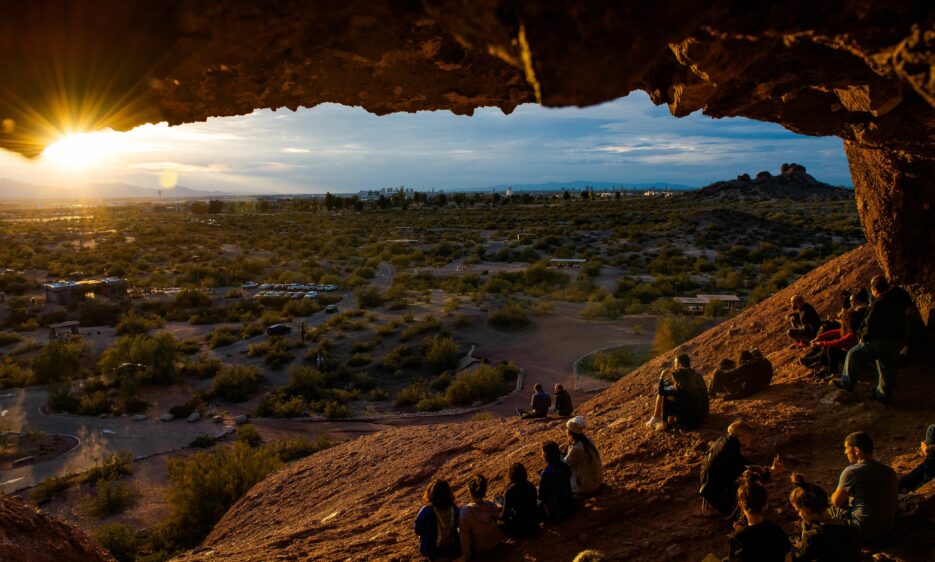CSPO Events CSPO in DC
- April 12, 2022
New Tools for Science Policy
No Help Wanted: Outside Technical Advice for the US Military
John Alic
- April 22, 2022
New Tools for Science Policy
Broadening STEM Participation in Rural and Remote Communities
Cultivating regional STEM hubs in rural Arizona communities

Kalman Mannis
- April 28, 2022
Imagining COP60: Scenarios, Sci-fi, and Policy Tools in Post-Normal Fiction
Last year’s COP26 was one of the most widely followed events in the history of climate politics. Though new, more ambitious agreements were reached, the world was left with big questions about whether nations would be able to limit global warming to 1.5°C—and how we will adapt to the changes and climate chaos coming.
In his debut book, Our Shared Storm: A Novel of Five Climate Futures, climate fiction author Andrew Dana Hudson imagines the five possible futures for the COP and climate politics. Inspired by the IPCC’s Shared Socioeconomic Pathways scenarios, which were used in the recent Sixth Assessment Report, the stories examine the cultures of climate policy making in futures that range from hopeful to harrowing. The book also includes non-fiction discussions of the opportunities and challenges of writing climate fiction and using stories to advance policy thinking.
Andrew Hudson
- May 23, 2022
Webinar: What Is Biosecurity for the Twenty-First Century?
After September 11 and the anthrax attacks in 2001, the United States adopted a top-down governance structure for bioterrorism that famously employed “guns, gates, and guards” to prevent attacks, while keeping track of suspicious “insiders” who might cause harm. But today, after the emergence of the novel coronavirus and its variants, society’s idea of what constitutes biological security and safety is changing. Looking toward a future in which gene editing can be done by do-it-yourselfers, biological engineering is common, and environmental changes shape new biorealities, the old top-down model of biosecurity will not be up to the task.On May 23 at 3:00 PM ET, join Melissa Haendel (University of Colorado Anschutz Medical Campus), David Gillum (Arizona State University), Sam Weiss Evans (Harvard Kennedy School), and Yong-Bee Lim (Council on Strategic Risks) to discuss how to reimagine biosecurity and biosafety—and even the relationship between biological research and society—for a new era. - May 25, 2022
New Tools for Science Policy
Advancing Climate & Natural Resource Policy Through Peer-to-Peer Knowledge Exchange
Building networks in the Pacific Islands through the Pacific RISA
Just as the impacts of climate change are felt locally, effective plans and policies for climate resilience are often implemented locally. The extent to which resilience planning best practices are shared among decision makers depends on multiple factors, including the availability of human and financial resources and the relevance, legitimacy, and accessibility of the knowledge.
In this New Tools seminar, Victoria Keener will share examples of how the Pacific RISA is using its role as a science and policy boundary organization and the P2P framework with different stakeholder groups to advance and accelerate climate adaptation initiatives and policies that consider climate data and models, regional geopolitics, social equity, and financial risk.
Victoria Keener
- May 26, 2022
Involving the Public in Participatory Scenario Planning in Maui, Hawai‘i
Learn about a multi-year stakeholder-intensive process on Groundwater Recharge to simulate impacts of development, conservation, and climate change

In this project, a participatory scenario planning process and modeling framework was used to demonstrate and communicate the consequences and tradeoffs of alternative land management strategies under a changing climate, and to serve as a tool for decision making under environmental and socioeconomic uncertainty on the island of Maui. An integrated land cover/hydrological modeling framework was developed using GIS data, stakeholder input, climate information and projections, and empirical data to estimate future groundwater recharge on Maui. Four future land-cover scenarios and two downscaled climate projections representing wet and dry climate futures were used to estimate average annual groundwater recharge at the end of the century. The future land-cover scenarios were codeveloped with over 100 diverse stakeholders to portray feasible development futures: Future 1 – ecological conservation-focused, Future 2 – status quo, Future 3 – development-focused, and Future 4 – balanced conservation and development. The estimated mean island-wide recharge rate increased under all future land-cover and climate combinations, although results varied by watershed. Results showed that urban expansion is currently slated for coastal areas that are already water-stressed and had low recharge projections. Through co-development of and participation in this research project, municipal water utilities, policy makers, and planners increased their familiarity with uncertainty and climate projections and are using results to choose watersheds to develop for new freshwater sources.
This completed project will demonstrate how the co-development of climate research through participatory scenario planning and modeling can accelerate the uptake of complex climate data and projections into local decision making by increasing familiarity with uncertain futures.
Victoria Keener
- June 08, 2022
New Tools for Science Policy
Braiding Birthwork, Racial Justice, and Smart Technology
Alexandrina Agloro, Stevie Merino
- June 22, 2022
An Experiment in Deliberative Democracy
Lessons from the Conference on the Future of Europe
What does the future look like? Who should decide it? Faced with threats like Brexit, the European Union (EU) institutions had a surprising answer: the people.
The Conference on the Future of Europe is an unprecedented experiment in transnational, large-scale deliberative democracy which led to 49 proposals for the future of the EU and more than 300 concrete measures for the European Institutions to implement. What can we learn from Europe, and how can we use deliberation to improve our democracy? On June 22 at 12PM ET, join Gaëtane Ricard-Nihoul (European Commission, remotely), Servane Metzger (French Ministry of European Affairs, remotely) and Yves Mathieu (Missions Publiques, in-person) to learn more about the unique process of the Conference on the Future of Europe and the experiences of citizens and decision makers.
Gaëtane Ricard-Nihoul, Servane Metzger, Yves Mathieu
- October 07, 2022
New Tools for Science Policy
Creating Justice, Trust, and Inclusivity in Climate Policymaking
How can science communication address wicked problems?
How can science communication address wicked problems?
Cimate change is a wicked problem that cuts across different policy domains, brings disproportionate impacts to different communities, and intensifies inequalities. Addressing wicked problems requires a collective decision process that can integrate different knowledges. On October 7 at 9AM ET, join Kaiping Chen (University of Wisconsin-Madison) to learn how science communication strategies, in-person community engagement, and community data analysis can create inclusive public policy.
Kaiping Chen
- October 24, 2022
Webinar: Is There Really a STEM Workforce Shortage?
Claims that there is a significant shortage of STEM talent have been a running feature of STEM workforce policy discussions since the 1950s. The outcomes of these discussions influence not only federal investment in education and training, but also labor and immigration policy, as well as efforts to diversify the STEM workforce. Yet, as Ron Hira writes in Issues in Science and Technology, the data to bolster such claims are often lacking, and some voices are louder than others. How can STEM workforce needs best be determined, and how should policymakers balance the many factors in play?
On October 24 at 1:30 PM ET, join Howard University’s Ron Hira, Trevor Wagener of the Computer & Communications Industry Association, Matt Sigelman of the Burning Glass Institute, and Iris Wagstaff of Wagstaff STEM Solutions in a discussion moderated by Lydia DePillis of the New York Times on how to make STEM workforce discussions more nuanced and inclusive.